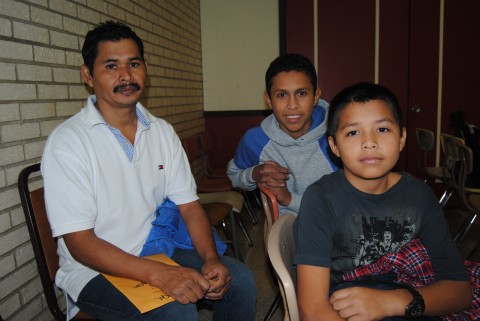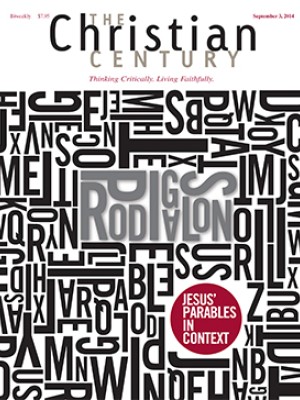Churches aid Central American refugees

For thousands of Central American children fleeing threats of gang violence, the multiweek journey to the United States has meant trusting human smugglers, hitching rides through Mexico, and hoping they survive the experience.
But once they’ve crossed the border and spent several days in detention facilities, some of those traveling with a parent receive a warm, albeit brief, reprieve. They’re finding refreshment at church-run refugee centers, where they eat, shower, and regain strength before boarding buses for points north.
Catholic Charities agencies and their ecumenical partners are delivering humanitarian aid in the Texas cities of McAllen, Brownsville, and El Paso, as well as Yuma and Tucson, Arizona.
Catholic Charities put operations on hold at sites in Laredo, Texas, Artesia, New Mexico, and Fontana, California, in early August due to seasonally slowing migration patterns and a change in policy enforcement. Increasingly, individual parents with children are no longer released but are instead handed over to agents in charge of deporting removable aliens.
Read our latest issue or browse back issues.
The outreach from faith groups marks a stark contrast to anti-immigrant resistance seen in places such as Murrieta, California, where protesters on July 1 blocked buses carrying migrant children. For those involved in these ministries, it’s a matter of doing what God expects in situations of dire need.
“There are those who are against helping the immigrants, but way more people want to say, ‘Welcome’ and ‘How can I help?’” said Sister Norma Pimentel, executive director of Catholic Charities of the Rio Grande Valley, which opened McAllen’s refugee center at Sacred Heart Catholic Church in late May.
From October 1 through July 31, 63,000 unaccompanied minors were apprehended on the U.S. southern border, according U.S. Customs and Border Protection. Most have come from Honduras, Guatemala, and El Salvador, where they say gangs are extorting large payments, recruiting teens and preteens, and murdering those who won’t cooperate.
In a related migration trend, another 63,000 have arrived since October and are lining up in most cases to seek asylum. That’s up from 11,000 detained between October 1, 2012, and September 30, 2013.
Before August, families were generally permitted to board buses and stay with relatives in the United States while they await court hearings. Now CBP hands them over to Enforcement and Removal Operations, although circumstances can still require some to be released instead with a notice to appear in court, according to Rio Grande Valley Border Patrol spokesman Omar Zamora.
Either way, they first spend multiple days in processing facilities, where observers and former detainees say migrants are seated shoulder-to-shoulder on floors, even in bathrooms, with no room to lie down and sleep.
After that detention, some—especially men with children and pregnant women by themselves—are continuing to show up in downtowns after they’re processed, according to Kim Burgo, senior director of disaster services for Catholic Charities USA. With fewer mothers and children in the mix, Sacred Heart saw its daily refugee numbers drop from 200 in late July to about 40 on August 8.
By the time U.S. Border Patrol agents leave parents and children at bus stations, they’re exhausted, dehydrated, and hungry, according to Hermi Forshage, a McAllen refugee center volunteer who interviews new arrivals. They rely on the center, staffed by as many as 300 volunteers a day at peak times, to build them up for the rest of their journey.
“When you treat someone like a human being even for a couple of hours, that can put a smile on their face,” said Blair Roth, a volunteer from McAllen. “That gives them energy to move on.”
Since the McAllen refugee center opened in early June, 6,000 migrant children and parents have passed through. Hundreds more have visited three faith-based relief centers in Laredo, where Methodist, Catholic, Episcopal, and Baptist congregations formed the Laredo Humanitarian Relief Team to handle the crisis.
In McAllen, local churches divide up responsibilities. Calvary Baptist Church washes cot linens. St. John’s Episcopal Church prepares travel kits with snacks, water, personal hygiene items, and Spanish-language prayer cards. Other churches send volunteers to wait for migrants at the bus station and direct them to Sacred Heart five blocks away.
On a Saturday in mid-July, traffic at the center was light due to a train derailment in Mexico but was otherwise fairly typical. Volunteers in green vests lined up and clapped as a group of eight parents and kids from Central America arrived.
Luis, an El Salvadoran construction worker, who declined to give his last name at the request of Catholic Charities, and his two boys, age six and 11, sat down for soup prepared by the Salvation Army. They then went outside for showers in a mobile unit. If time permits, they would be able to nap on a cot in an air-conditioned tent, don donated clothes, or see a doctor in a mobile medical unit before starting their bus trip to Irving, Texas, where Luis’s sister lives.
Church-run refugee centers are apt to be needed for at least a few more months, organizers say, as the migration wave could pick up again after the hot, dry season. So far, they have reportedly not faced pressure or protests from groups who want child migrants deported.
Luis held back tears as he contrasted the welcome at Sacred Heart to his family’s life in El Salvador, where risks were so high that he stopped sending his elder son to school.
“There are no words to describe this reception,” Luis said in Spanish. “It’s even better than family.”
This article was edited August 18, 2014.





